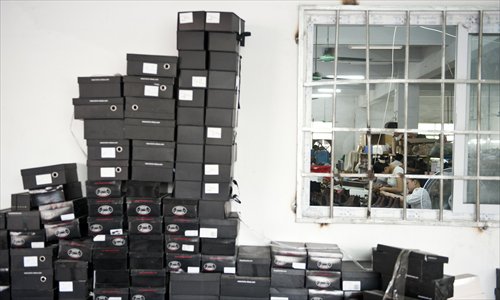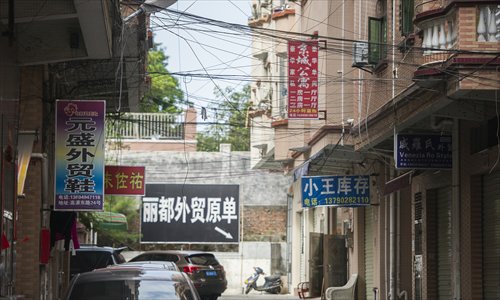Dongguan apartments used as workshops to pump out knockoff goods
It's not news that fake products are everywhere in China. But it was still shocking when all kinds of counterfeit goods worth millions of yuan were found in rental properties in Dongguan. The infringers have made a haven for fakes out of cheap and hidden houses in the city's industrial districts. Such fakes have reached every corner of China and even abroad. In solving the problem, along with a forceful crackdown, it is time to call for building domestic brands as part of national anti-knockoff efforts.

Shoe boxes are packed outside a small factory in Dongguan. Photo: CFP
Chinese e-commerce mogul Jack Ma once said that fakes are the pain of the Chinese economy. Now it seems that another source of pain was diagnosed, as it has been revealed that rental apartments in Dongguan, South China's Guangdong Province are used as underground factories for the large-scale production of fakes.
In 2015, during a crackdown on counterfeit goods across Dongguan, a city with a developed manufacturing industry, local public security departments filed and investigated 150 cases and arrested 175 people, seizing fake products worth 240 million yuan ($36.65 million). During the investigation process, rented properties, often home to poorly-paid factory workers, emerged as a key link in the chain in the production and selling of fakes.
Rental houses have been exposed as essential tools for counterfeiters before. In many previous cases, items such as fake iPhones, shoes, cosmetics, and even shampoo were found in rented houses not only in Dongguan but also in other cities across China.
Before they were busted, innumerable fakes gushed out of these rented houses into online shops, supermarkets and shopping malls, even reaching consumers abroad via online stores.
"China has already put great emphasis on cracking down on fakes, but when it comes to original equipment manufacturing (OEM) factories and small workshops, illegal activities are still deeply hidden. They know how to cope with inspections," commented Gao Fuping, professor of intellectual property rights at East China University of Political Science and Law.
An OEM factory manufactures brand-name products for other companies to make a marginal profit, rather than producing their own branded items.

Billboards hang outside rented houses in Dongguan. Photo: CFP
Rented property as workshops
In Dongguan, more than 280,000 rental apartments were registered at the relevant management department by the end of 2014, according to official statistics, Nandu Daily reported. These apartments house over 2 million residents. But estimates say that only accounts for 90 percent of the rental apartments in the city, which means there are still a number of houses that are being hidden from the authorities.
In the years when the manufacturing industry in Dongguan was getting started, large amounts of foreign capital and waves of migrant workers swamped the city, so locals built houses to serve both as factories and places for workers to live in. And as the manufacturing industry boomed, the number of apartments rose rapidly as the city saw a dramatic increase in population.
With the city's highly mobile population, these rental houses are a hotbed for crime. According to statistics, about 90 percent of criminal cases and security incidents in Dongguan involve rental properties. When it comes to producing fakes, these houses, which are often cheap to rent and packed with experienced factory workers, no doubt provide an opportunity for those unafraid to flout the law.
Li Fei, owner of an OEM factory that makes electronic products, told Nandu Daily that Dongguan follows an export-oriented economic model. It means though they belong to different sectors, the factories all start by processing material provided to them by their clients. The big factories get orders from foreign enterprises and then subcontract some orders or certain processes to small workshops. And small workshops poach skilled workers from big factories to meet demand. Gradually, these small rental house-workshops grew to be the countless cells that carry nutrients to the big factories.
They started as legal workshops. During busy periods, these workshops played a significant role in Dongguan's legitimate manufacturing industry, Li said, but after 2008 when orders dwindled, the small workshops began to manufacture more and more counterfeit goods.
"You may say these rented houses manufacture fake products, but they are of high quality and good price and they sell well," Li said, adding that for the small workshops, nothing has changed except that their orders are now are from trade companies or online stores instead of foreign enterprises with intellectual property rights.
The productive force of these illicit workshops is amazing, as seen from the recently publicized cases. A workshop in an ordinary-looking flat in Dongguan's Fenggang township produced and sold 30,000 fake iPhones in half a year, with their knockoffs then sold in more than 20 provinces and cities in China.
Meeting demand?
One notable aspect of Dongguan's crackdown on counterfeit goods is that many of the cases involve fake shoes. Tens of thousands of fake sports shoes have been produced in rental properties in Dongguan townships like Houjie and Wanjiang and sold both in China and in countries like the US through the Internet.
But local residents seemingly don't pay special attention to such cases. A woman who often buys shoes in Houjie said she is quite satisfied with the items she has bought, which are of relatively high quality and, most importantly, cheap.
Aqiang, a shoe shop owner in Liaoxia village, has dealt with shoes for over 20 years. He witnessed how the fake shoe trade grew little by little.
At first, workers from factories sold cheaply the leftovers of foreign enterprises' orders or shoes with defects, all made for internationally famous brands. At that time, without realizing it was illegal, more and more factory workers started to sell such products. "Brand-name shoes, cheap and high-quality. The word began to spread. Even today, it still attracts many from inland," said Aqiang.
Gradually, when the leftovers from factories could not meet market demand, some workers or workshops that previously only manufactured shoes for big factories saw a business opportunity and began to produce brand-name "leftover" shoes themselves.
As Zheng, the owner of a factory in Houjie explained, after years of development, every link in the shoe production chain is mature. At first people processed supplied materials according to the plans and technicians, provided by foreign enterprises. And sometimes the materials have to be exported. But now Houjie can produce famous brand-name shoes all on its own.
Zheng has family members living in Hong Kong, so he can immediately buy the latest fashionable shoes when they come out and bring them back to Houjie. His workers can take the shoes apart and reverse-engineer them. As the locally-available materials are sufficient and workers are as skillful as those working at big factories, these rental house-workshops can produce shoes virtually identical to the real thing.
Now almost all the rented house-workshops advertise themselves as making products for exports, but Aqiang said they all sell knockoffs to the local market.
"The scale of the fake brand-name shoes industry is incredible now. Some of my friends have been arrested. But still many persist," Aqiang said, "People all know that our shoes are knockoffs but are willing to buy them regardless. They are in great demand." To him, as long as there is demand, there will be supply. "You need to arrest those who know and buy also, otherwise it will never stop."
But to Gao, this is simply an excuse. "It is not reasonable to restrict consumers. They only care about the price and quality of goods. Their buying behavior is legal as long as they buy from legal channels," Gao told the Global Times.
"After so many years of crackdowns, I guess people involved in this chain all know it is copyright infringement. They are mainly driven by profit," Gao said, adding that since such manufacturing industries contribute significantly to the local GDP, official protectionism more or less hinders effect of crackdown efforts.
Online hideouts
As the last stop before copycats reach consumers, many shop owners in Dongguan have turned to the Internet to elude police.
Hai Ying, owner of an online shop in Liaoxia village, previously had a shop in a shopping mall and sold counterfeit shoes. But as the crackdown tightened recently, she closed her store and concentrated on selling shoes online.
On one hand, online stores make their business easier. According to Hai Ying, they simply place a photo of a sample shoe or a picture of the original shoe on their store's website, and then wait for orders before really going into production. This saves them from the pressure brought about by having unsold goods in stock that they experienced before.
Online stores are also safer. Since goods sold online go to every corner of the country and shop owners can easily conceal their identity, law enforcement officials find it harder to trace the source of ersatz sneakers.
Hai Ying knows people who were checked by the police before and their receipts and credit history were cited as evidence of their crime. Now online shops avoid using credit cards or providing receipts. When selling online, they use others' bank accounts to cover up their involvement.
At present, however, people are increasingly selling fake products on WeChat. Last April, a woman surnamed Qin used WeChat to sell fake Nike and adidas shoes but was reported and detained after only three months.
As Gao understands, while online stores pose new difficulties for those looking to stamp out the fakes trade, it might be also easier for police to track lawbreakers online once they decide to focus on a store, since Internet communication does leave clues.
Building domestic brands
Fang Peiji, head of the Dongguan Shoe Material Association, told Nandu Daily that some of his friends wanted to build their own brands and invested millions of yuan in brand promotion, but had little success. So they went back to knockoffs for profit.
"Piggybacking on established brands could earn people easy and quick money, while it is costly, both in time and money, to build a new brand. Most importantly, it is a long-term process," Gao said.
"In this regard, what the government can do, though important, is only external. Subsidies from the government itself cannot solve the problem. The key is that the enterprises have a long-term vision and focus on long-term development."
Putian, a city in East China's Fujian Province used to be called the "hometown of knockoff shoes." The region started efforts to promote their own brands in recent two years during the national crackdown movement. Now several of its shoe brands sell well on platforms like Taobao.
Nandu Daily - Global Times
Newspaper headline: House of fakes